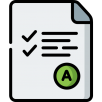You’ve probably come across the term personal statement while you were reading the list of requirements your college application has to meet in order to be taken into consideration. What’s more, a personal statement, as well as a statement of purpose, is an essential part of your application.
While it’s understandable that you want to get everything done as soon as possible, you should still take some time and focus on each step of the process to avoid common pitfalls. When you know what to include and how to write the application essay it gets easier to complete it.
Personal Statement Definition
Due to the fact that a personal statement is not like other documents you need for college admission, it’s easy to struggle with understanding its primary objective. That’s why it’s necessary to define the term first. A statement of purpose, or personal statement, is a paper or document wherein a student is meant to give concrete evidence of his/her promise as a member of the academic community and depict an image of their personality to the committee.
The personal statement goes by many names including application essay, admission essay, personal essay, reflective essay, and narrative essay. Regardless of the term provided in the application materials, your goal is to represent your full potential and describe hopes, goals, and talents that make you a perfect fit for that college. When writing the statement of purpose, it is necessary to demonstrate how your values, non-traditional educational background, and other factors have influenced your academic career.
There is no one size fits all rule for personal statements. Every student can use their own unique approach to show what makes them or ideal for some particular institution.
If you’re looking for help writing your personal statement and don’t know where to start, check out Edusson – a cheap custom essay writing service with expert writers who can provide you with personalized and professional advice. Whether you’re looking for inspiration or help with writing your statement, Edusson is the place to turn for high-quality assistance.
Types of College Statements
In writing, there is no such thing as one, generic form of anything and a personal statement isn’t an exception. We can divide these statements into two forms:
- The general or comprehensive personal statement – gives a student the maximum freedom regarding the things they want to write. Also referred to as the open-topic essay, this type of statement only has formatting rules you have to follow, everything else is up to you. You just have to create a perfect way to represent yourself and start writing;
- The response to a specific question – unlike the above-mentioned type of a statement of purpose, this form requires students to answer adequately to a certain question in order to demonstrate their knowledge, expertise, skills, and plans for the future We can also divide personal statements based on the programs, undergraduate, and college graduate.
College Personal Statement
College graduate personal statements usually involve questions a student has to answer throughout the essay. This type of admission essay is considered more demanding and advanced. The reason why you’re more likely to write the response to a specific question is simple – the graduate applicant is expected to have a certain level of independent thinking.
By the time they graduate, students develop critical thinking skills and get more experience in life. As a result, you also have a clear idea of what you want to study further and how a certain program can help you achieve that goal.
Bearing in mind that most graduate programs include some form of financial aid wherein a student has to return for research work or teaching, the applicant has to demonstrate he/she is capable of that work. This explains why a vast majority of personal statements for graduate students focus on applicants’ academic and professional interests rather than vague subjects.
Undergraduate Personal Statement
Application essays for undergraduate students usually fall into the category of general or comprehensive statements. You have the liberty to write a statement that shows your motivation, inspiration, and other factors that make you an ideal candidate.
Why do undergraduate students write open-topic essays instead of a response to a certain question? At this point, a student is eager to learn, start a new chapter in life, and finally step into adulthood. That being said, the applicant doesn’t really have any idea of what will come after college.
For students who want to enroll in the underground program, the focus is on demonstrating how he/she has explored their interests and the world around them. They talk about their passions and desires while demonstrating how they relate to other people, form opinions, and show a glimpse of their personality.
Have no time for writing your personal statement?
Just click on the button below!
Having a well-written personal statement tailored to your desired college is often key to gaining admission. To make sure that your statement is up to the standard necessary, it might be worth considering the option to buy college essays. This way, you can ensure that you have a well-developed, intriguing, and highly personalized essay that will give you the best chance of standing out from the competition.
Writing a Personal Statement
Thousands of thoughts go through our minds on a daily basis, but when we’re supposed to sit down and start writing it’s difficult to think of something usable. The problem becomes even worse when the text you have to write can make or break your chances of getting your application accepted. No need to despair! With a few simple tips and tricks, you can create your personal statement easier than you thought.
Guidelines for Writing Personal Statement
The personal statement isn’t something you should do just to “get it over with”, this type of essay requires a lot of thinking and analyzing. You have to evaluate your own hopes, dreams, passion, motivation, academic success, or even high school education (if you’re just about to enroll in college) and many other things before you determine what and how to write.
To make this process easier for you, follow the guidelines listed below:
- Take a few moments to think of the information you want to include (or how to answer a specific question);
- Create a draft without focusing on word count and character length, just write whatever comes to your mind;
- Don’t rush, take your time. You don’t have to complete your personal statement in an hour or a day;
- Consider a dictionary your best friend, it will help you avoid overusing some words. Plus, your personal statement should also demonstrate vocabulary skills;
- Focus on your strengths, but mention specific examples rather than making it look like you’re bragging;
- Don’t compare your personal statement to someone else’s. Two people have different experiences and views of the world around them;
- Read it out loud to see whether it seems right.
Structure and Format of Personal Statement
The secret to a high-quality personal statement is in the format. Let’s take a look at the outline you should follow:
Short Introduction
At the very beginning of the admission essay, start by briefly introducing yourself, your interests, and your motivations. This is a short paragraph that acts like a hook, it catches a reader’s attention and makes them interested in you and your personality.
Academic interests and achievements
Regardless of whether you’re an undergraduate or graduate student, there’s always something you can write about your education so far. Don’t exaggerate anything, focus on facts and show your interests, achievements, or plans you have for your academic life.
Graduate students can also include a description of specific classes they’ve taken and professors they’ve had.
Background Experiences
If your task is to write an open-topic essay, then it’s useful to dedicate a paragraph to background experiences that aren’t directly related to academic life but have made a major influence on your life and education in general.
Extracurricular Activities
This isn’t about hobbies and other stuff. Instead, you should focus on extracurricular activities associated with your field. For example, you can list projects where you participated, volunteer work, and other activities you joined outside the school, but greatly contribute to your choice of the study program, college, etc.
Publications or other Professional Accomplishments
In this paragraph, students can briefly mention publications where their works were published. This is primarily reserved for graduate students who have already participated in some academic research.
Why You’ve Chosen the Specific College/Program
It’s always useful to describe why you’ve chosen the specific college or program and if you haven’t done it somewhere above, now is a good time to add this info.
Conclusion
Conclude your personal statement with a strong paragraph where you’ll summarize your greatest strengths that make you a perfect person for the specific program.
How to write a good Personal Statement
You know the basic guidelines and format for your statement of purpose, but to write for me essay well, you should also follow these tips:
- Write in an enthusiastic, concise, and natural style;
- Try not to overdo it with humor, your admission officer may not have the same sense of humor so it won’t accomplish anything;
- Think about the message you want to convey and work your way to it;
- Avoid general commentary;
- Use examples;
- Be careful with controversial comments and expressions, try to avoid them;
- After you’ve written the first draft, start editing and proofreading to ensure your personal statement meets the required word count.
What to include in a Personal Statement
To impress the committee, your personal statement should:
- Explain why you want to study the course;
- Provide evidence to demonstrate that not only do you meet all the criteria, but also that you took the time to research the course or profession;
- Outline how you’ve pursued the interest in a chosen subject beyond the current syllabus;
- Depict why you chose that particular college for your academic education;
- Reflect on your experiences and explain what you’ve learned from them and how they helped you develop an interest in a certain subject;
- Demonstrate transferable skills;
- Show that you are a critical thinker;
- Mention the long-term goals.
Now that you know what to include in your personal statement, here are some things you should leave out of it:
- Don’t copy and paste your old personal statement;
- Too personal and irrelevant information;
- Over-used clichés;
- Random lists;
- Unproven claims;
- Vague expressions;
- Exaggeration;
- Negative comments or excuses.
Personal Statement Examples
It’s all about practice and proper topic selection (if you have the liberty to do so). The more you write this type of essay, the easier it will be to create it for your college admission. Below, you can see examples of personal statement essays for both graduate and undergraduate students.
Personal Statement for College Examples
- What are the reasons you wish to pursue the graduate program and how does it relate to your career goals?
- What are your qualifications for admission?
- How do you see your career five years from now?
- What are the experiences in your academic life that shaped your interest in the graduate program?
- What are the greatest challenges your profession faces right now and how will this graduate program help you overcome them?
Example #1
In movies, a teenage girl carrying around a journal is cliché or means that she has something to hide. In my life having a journal means so much more. Writing an entry puts my bottled emotions into words.
There was this one specific day in school, I was having a rollercoaster of emotions. My boredom slowly turned into anger that’s when I pulled out my journal. During that one sitting, I wrote six poems. I looked back at my writing and I was proud of myself, proud that I turn my negative emotions into something creative and positive. From that day on I always carried around that journal from essays to poems, even if I didn’t write in it knowing that I could anytime I needed gave me a sense of security. It seems to give me power over my emotions.
However ever since I started carrying my journal I noticed in school whenever I would take it out people would stare trying to catch a glimpse of my words. Before I used to conceal and hide the pedophile that I wrote in my journal, but now I handed them my book I haven’t told them to write a page. I was not only becoming more creative in my writing but I was coming more confident. I can say I’ve changed my mindset thinking that having a journal impact me like this could help someone else. I saw people’s faces light up when I handed them my book to write in they felt special. Soon my journal became a gallery of people’s emotions.
People trusted me with their thoughts and they express them through drawings, poems, songs, or even essays. So many people were inspired by my journal they started journaling. It showed me how journaling is almost therapeutic. I was happier and what used to be writing only sometimes became an everyday thing even though my vocabulary was growing. Having this hardcover book with me made me feel like I could be anything and everything I wanted I was able to put out my thoughts and understand them and it felt so good.
Journaling impacted my life so much I’m thinking of majoring in Media and Communications hearing people’s thoughts including my own and putting them out for the world to hear them. The world is just a big diary ready to be made a mark on. Writing eventually turns into saying how you feel and I want to be that journal to people. I want to understand people’s emotions and share them.
And that’s why I’m so into journaling just knowing whenever my feelings feel like they’re getting to be too much documenting them and expressing them not only internally but on paper. I never knew one simple experience can change how I feel about my future. I believe in it because I think it works and it keeps me sane. Journaling may be cliché but the things within those pages are far from that.
Undergraduate Personal Statement Examples
- Discuss accomplishment, event, or realization that sparked personal growth and a new understanding of yourself and others.
- Recount a time when you faced a challenge or setback.
- How did it affect you and what did you learn from it?
- Describe a problem you solved or an issue you would like to solve.
- A person who inspires you.
- What do you want to accomplish in life?
Sample Personal Statement
We live in the 21st century, in the era of the internet and media. It is safe to say that media is the most powerful entity on the planet. Education is vital for every individual as it shapes our views of the world and prepares us for a career that comes after. I wish to combine media and education in order to fulfill my ambition to become a journalist. Although media is a force to be reckoned with, we witness the rise of low-quality journalists who focus on clickbait posts and reports. I want to use the platform to raise awareness of important issues and give my contribute to society.
Experience is everything, and despite the fact I am not a person who spent years working as a journalist, my education has given me a solid foundation on where I can build my career. Throughout my high school education, I have worked as an editor of school papers and websites. Not only did I report current events, but I also strived to address the common concerns of my fellow students, and spark debates that contributed to major changes that improved the learning experience and atmosphere among students.
Thanks to my strong work ethic, reaching any deadline is not a problem and my curiosity motivates me to learn more. The reasons I want to enroll in this program are numerous. Based on my research, it was easy to conclude this is the program that will help me become the journalist I really want to be. The program will help me improve my writing skills, master the art of journalism, and grow on a personal and professional level.
Personal Statement Editing and Writing Service
You’ve written your personal statement. Great job! But, what’s next? You can’t submit it without proofreading and editing. We can’t be objective towards our own work. We see it the way we’ve imagined it in our minds, not as it is. This is where Edusson’s proofreaders and editors step in! Professional, qualified editors with experience in personal statement proofreading and editing service can polish your essay and boost your confidence before you send it with your admission. Save $20 on editing and make your order today. Alternatively, consider Essay Writing Service if you are a little unsure of your ability to write your personal statement right away. Probably, you’ll get a perfect sample to build your own essay!
Things You Will Improve Through Personal Statement
- Writing skills, because you’ll know what mistakes to avoid
- Grammar
- Spelling
- Your chances of getting an acceptance letter
- Formatting
- Professionally looking personal statement that will impress every admission officer
- Peace of mind










